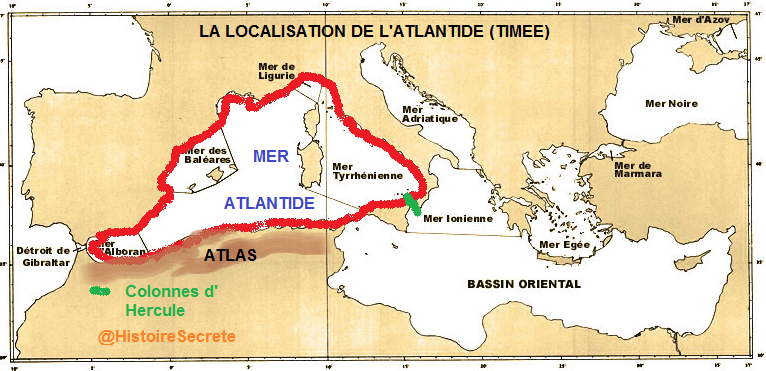Atlantic Sea
The Atlantic Sea is a geographical term, used by classical writers, such as Plato and Aristotle. In the context of Atlantis studies, it is not to be  confused with what we now know as the Atlantic Ocean. For the ancient Greeks ‘Okeanos’ was the name of a great river that flowed around the known world.
confused with what we now know as the Atlantic Ocean. For the ancient Greeks ‘Okeanos’ was the name of a great river that flowed around the known world.
>The valuable Theoi.com website notes(c) “In the ancient Greek cosmogony the RIVER OKEANOS (Oceanus) was a great, fresh-water stream which encircled the flat disc of the earth. It was the source of all of the earth’s fresh-water–from the rivers and springs which drew their waters from it through subterranean aquifers to the clouds which dipped below the horizon to collect their moisture from its stream.”<
Plato never referred to Atlantis as being located in the Atlantic Ocean, instead, he placed it in the Atlantic Sea. In a recent book [1895], Carlos Bisceglia made one simple but highly pertinent comment – “If Plato had thought that Atlantis was an island located in what we today call the Atlantic Ocean, he would have written that his Atlantis was ‘in the Middle of Okeanos’.”
The first English translation of the Atlantis texts by Thomas Taylor at the beginning of the 19th century correctly translated the word as ‘Sea’, however, after that, most English translations used ‘Ocean’ including the most widely available offering from Atlantis sceptic Benjamin Jowett.
This claim of mistranslation is supported by Plato who noted that “in those days the Atlantic was navigable” (Tim. 24e), which clearly implies that in Plato’s time it was not. Additionally, Aristotle seemed to echo Plato when he wrote(a) that “outside the pillars of Heracles the sea is shallow owing to the mud, but calm, for it lies in a hollow.” This is not a description of the Atlantic that we know, which is not shallow, calm or lying in a hollow and which he also refers to as a sea, not an ocean. Both Plato and Aristotle seem to be describing a relatively small body of water. So, what sea were they referring to? The most popular suggestions so far are (1) The Western Basin of the Mediterranean, (2) The Tyrrhenian Sea or (3) The chotts of N.W. Africa.
Among others, Mário Saa a Portuguese writer identified the Western Mediterranean as Plato’s Atlantic Sea on a map in his book, Erridânia: geografia antiquíssima [1677]. A French website(b) supporting this identification has offered the map below. I also endorse this as a possible location for Plato’s Atlantic Sea in my book Joining the Dots.
(a) https://classics.mit.edu?Aristotle/meteorology.2.ii.html
(b) http://histoiresecrete.leforum.eu/t716-quelques-questions-se-poser-sur-le-Tim-e-Critias.htm (registration required)
(c) OCEANUS – Earth-Encircling River of Greek Mythology (theoi.com) *
